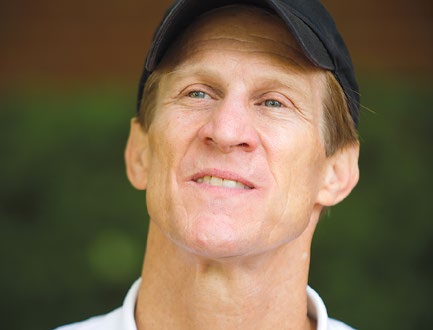As a student in the early 1970s, Pro Humanitate was not a compelling voice informing my Wake Forest experience. Either I was too self-absorbed in my world of academic discovery, political activism and campus involvement, or the University culture did not strongly reflect this ethos of service to others at the time. It probably was a little bit of both.
After returning to Wake Forest in 1981, I volunteered with then-University Chaplain Ed Christman (’50, JD ’53) at the Samaritan Ministries Soup Kitchen and had one of my first encounters with Pro Humanitate. With his visual challenges we were careful not to let Ed get too close to the cooking and food preparation, but in his own gracious and exuberant way, he served as the official greeter of guests at the door. I was inspired that day by how Ed opened his heart and arms to welcome all of these “strangers” needing a warm and nutritious meal and some unconditional love. In the spirit and style of an Old Testament prophet, Ed called me and others to live a life of compassion and service. That early exposure to Ed and the soup kitchen grabbed hold of my mind and heart. I decided to volunteer regularly from that day forward, sharing this transformative experience with my family and many students through the years. This past fall as a culmination to our eight-week biblical study on servant leadership, nine students joined University Chaplain Tim Auman and me to spend the night serving our guests at the Samaritan Ministries, a homeless shelter.
Today my perspective on Pro Humanitate is that it is not simply a well-meaning expression of personal and institutional values, but rather it is both the intent and the follow-through of an ethic of service for others. When it comes to describing Pro Humanitate, I like to think of the University as a big, luscious garden, where over the years and across the campus, students have planted seeds of service ideas and initiatives, many of which have taken root and grown through good cultivation (advocates, social entrepreneurs, partnerships) and timely nutrients (resources and space).
I first met Jessica Jackson Shortall (’00) and Karen Stephan Borchert (’00) in 1999 when they came to visit Paige Wilbanks, then director of volunteer services, and me seeking help for their new student organization, Homerun. Jessica and Karen loved to both cook and care for people, and so they put these two passions together with a dream to start a food and hospitality service for people needing short-term assistance. What a joy it was for Paige and me to help them establish their organization, find a kitchen and food pantry on campus and connect them to needy families. Before long, Homerun had 30 student volunteers cooking, serving and delivering 50 meals a week to elderly, infirm and needy people.
The full, life-giving impact of Jessica and Karen’s shared vision of Homerun became real to my family later that fall when a medical emergency threw us upside down. Unexpectedly, we received several meals and multiple expressions of care delivered to our door to support us and help bridge the crisis. Through the good stewardship and perseverance of Jessica, Karen and other dedicated volunteers, the small seed of Homerun has grown into the local and national collegiate organization Campus Kitchens, serving thousands of needy people.
The spirit and power of Pro Humanitate has found its full meaning and expression through this and many other student-initiated enterprises. It has been my privilege to be a sounding board, advocate, guide and cheerleader for these students along the way. Today when I ask a student, “What makes you feel the most alive?” frequently he or she will say, “I feel the most alive when I am engaged in service to someone in need.”
Through this process of personal growth, self-discovery and service to mankind, I and our students learn a little bit about the principles and practices of enlightened citizenship and what it means to be a servant leader. In the end, these students leave their own legacy at Wake Forest as they help cultivate the character and soul of their alma mater for years to come. The Garden of Pro Humanitate is alive and flourishing here.
Mike Ford (’72) is the associate dean for Campus Life. Samaritan Ministries honored him in 2011 with its first Good Samaritan Philanthropy Award.


